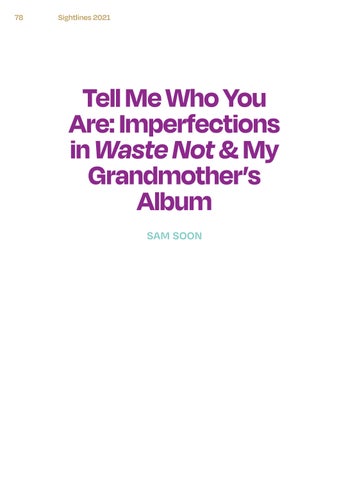78
Sightlines 2021
Sam Soon
Tell Me Who You Are: Imperfections in Waste Not & My Grandmother’s Album SAM SOON
Something is off. I am trying to put my finger on it. I’m leafing through page after page in my grandmother’s album. Each photograph contains the same face. Some images are missing, marked only by the silver corners that once held them in place. The playful and taunting captions inject the album’s pages with life. I approach Song Dong’s Waste Not (2005, fig. 1) in a similar way, meandering through rows of used medication bottles and empty decorative moon cake bags. I arrive on a small collection of strings and cords. They are discolored. Many have a patina of dirt layered over their threads. While seemingly disparate, these two archives tell the distinct stories of everyday family life from Chinese women’s perspectives. Elements like dirt, mess, captions, and missing photographs serve to convey vital information about the archivists behind the objects that are less apparent in conventional family archives. Imperfections in the family archive not only convey information about gendered family practices, they carry their women authors’ complex stories by contrasting often idealized representations of daily family life. After my grandmother passed, I discovered a photo album of hers that I had never seen before. I found no groups of smiling people, no Christmases, or children playing. My grandfather appears alone in each photograph. Leafing through the album, each page consisted of different pictures of him. Even more curious, the photographs had captions, a rarity for my family. Unlike other albums’ captions, these captions were funny. They didn’t convey information about the corresponding photograph’s contents, my grandfather. They poked fun at him. Somehow this already informal keepsake format transformed into something even less formal, yet disclosed so much about who my grandmother was and the ways she shared her affection. Waste Not was a collaboration between Beijing-based artist Song Dong (b. 1966) and his mother, Zhao Xiangyuan, made after his father, Song Shiping, passed away. Dong first exhibited the work in 2005 at Beijing Tokyo Art Project in Beijing. It featured over 10,000 of Zhao’s personal belongings, cultivated over
79
